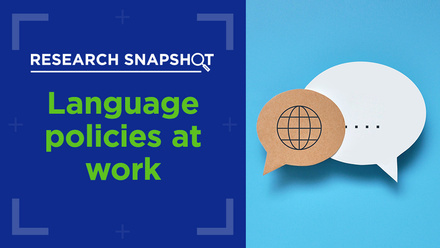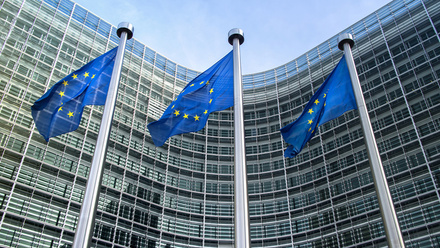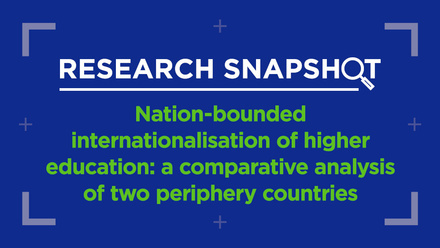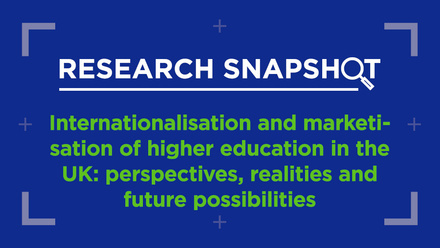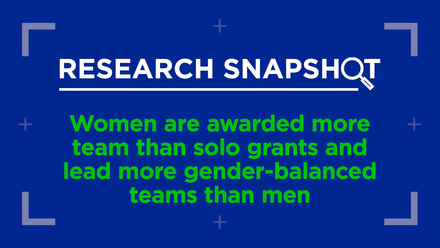The new problem of being ‘too international’

Higher education institutions that have successfully internationalised their education over the past decades are confronted with a new challenge. Even in an open and outward-looking society like the Netherlands, where The interplay between national policies and internationalisation have been rather favourable, the internationalisation of higher education is increasingly being questioned.
Why should Dutch taxpayers pay for the education of foreign students? Why can foreign students enter Dutch universities and push Dutch students aside? Why are courses offered in English, while Dutch students do not learn to speak or write properly in Dutch at our universities? Why are universities making money out of attracting more and more foreign students when we already have so (if not too) many foreigners entering our small country?
These are just some of the questions, perceptions or sentiments if you like, that dominate the fierce debate that erupted recently in the Netherlands about the sense and nonsense of internationalisation of its higher education. Maastricht University, claiming to be the most international university in the Netherlands, is a case in point.
The reality is that English has become – with some exceptions – the lingua franca of science; it is the global language of the academic world.
With an educational programme that is offered to a large extent in English, and well over half of its 17,500 students and almost 40% of its staff being non-Dutch, it perfectly illustrates the result of 30 years of deliberate internationalisation efforts. These were based on a strategic decision to develop this university as an institution with a strong European/international character, not only due to the location of the university in the periphery of the Netherlands, yet in the heart of Europe, but also because of the significance of Maastricht for Europe. Though this process went on unabated for a long time, and was even applauded by many, now the tide suddenly seems to be turning and internationalisation is being questioned.
The President of Maastricht University, Martin Paul – himself an ‘immigrant’ of German origin – reflects on this. The answer will definitely not be to turn the process of internationalisation around.
Fit for purpose
MP: We have not decided that all our education should be offered in English. But we have decided to prepare all our students for a professional career in an increasingly internationalised context. Whether they will follow an international career around the globe or take up a job here just around the corner, it does not make much of a difference. Actually, our own region, the southernmost tip of the Netherlands, is a highly internationalised area, bordering on Belgium and Germany and close to France.
With ten or more different nationalities in one class, what language are you going to use? Esperanto? It won’t be Dutch either.
I tend to follow the recommendation by the Royal Netherlands Academy of Sciences. They suggest defining for every educational programme how that programme can best address the needs and requirements of the labour market. That is exactly what we do, resulting in our highly internationalised programmes, which I believe really do fit their purpose. There is no ‘one size fits all’ approach to internationalisation and not all Dutch universities have the same perspectives. In the case of Maastricht, there is no question that the regional needs and opportunities in the Maastricht region underline a strong commitment to internationalisation.
The languages issue
MP: As mandated by our internationalisation strategy (‘fit for purpose’ being an integral aspect of this strategy), we of course offer programmes in Dutch, such as Nederlands Recht (Dutch Law). In other programmes we offer a choice, like in Psychology, where courses can be followed in Dutch or in English. But which language should be used for courses with an academic content focused on international issues and labour markets, such as International Business? It is simply not realistic to expect from the majority of our students, who are of non-Dutch origin, that they can learn Dutch in no time up to a level at which they can adequately understand, communicate, present and write academically. With our problem-based learning we have a very interactive educational approach. With ten or more different nationalities in one class, what language are you going to use? Esperanto? It won’t be Dutch either.
More importantly, it is of little use for them. The reality is that English has become – with some exceptions – the lingua franca of science; it is the global language of the academic world. And it is the first foreign language to be learned in most countries outside the Anglo-Saxon world.
Does the English need to be perfect? I am a German, is my English perfect? No, it is not, but it is good enough. Of course we have to guarantee certain standards, standards that allow oral and written communications in an academic context. We secure that.
A truly European university
MP: I am not in favour of a single-language university and am supporting the concept of multilingualism. The reality is that English is the most used language in our education, but on our campus you will hear many languages spoken. Actually we intend to nurture the use of other languages. We take pride in being a European university, implying both unity and diversity, in the use of languages as well as in many other respects. We offer free Dutch language courses to all our students because we are based in the Netherlands and Dutch is the mother tongue here. We also offer German and French language courses, and in some of our programmes these languages are also used in literature and discussions.
Thanks to internationalisation, in just a few decades the university has grown to its present size, which could not have been achieved in only a Dutch context.
We believe that there is a real need for students, whether from the Netherlands, from any other European Union country or from whatever country in the world, to follow a truly internationalised university programme that prepares them for a career in a globalised world, whether that will be in the Netherlands or elsewhere. That is what we want to offer in Maastricht, a truly international study experience, and from peers we understand that we do that pretty well. I really do not see why we should stop with that.
No alternative
MP: Interestingly, also from a local and regional perspective, there seems to be no viable alternative than to focus on a well-defined international profile. After the closing of coal mines in the 1960s – traditionally the region’s local source of wealth – the most southern region of the Netherlands was an economically deprived area. Maastricht University was established in the 1970s as a way to rebuild the local economy, which it has achieved with remarkable success. The university and associated academic hospital have become the largest employers and economic engines of the town and surrounding region.
The answer will definitely not be to turn the process of internationalisation around.
Thanks to internationalisation, in just a few decades the university has grown to its present size, which could not have been achieved in only a Dutch context. Probably more important, the university has connected the region with the world at large, which is the best guarantee for its future development and prosperity. Without the university, the region probably now would have been an inward-looking, economically stagnant area on the outskirts of the Netherlands.
The university has turned this process around by developing itself as a truly European and international institution. With 9000 foreign students and some 2000 foreign staff, these are not just nice words. The university brings the world to Maastricht and Maastricht to the world. By doing so it paves the way for future local development. Internationalisation has been the key to this progress.

